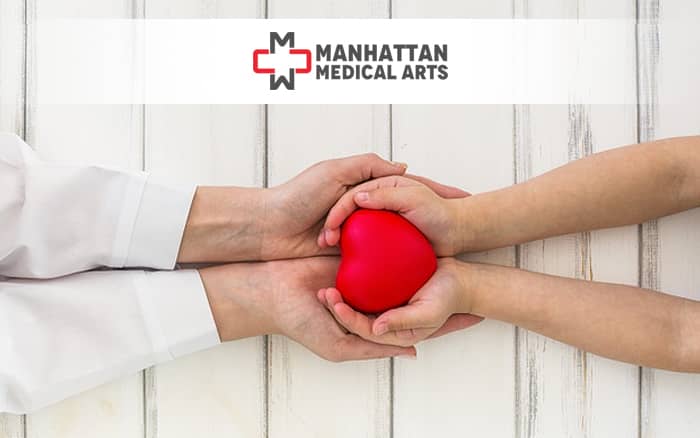Many types of heart disease exist and each has its own symptoms and treatment. For some people, lifestyle modifications and medications can make a considerable difference in improving their health. Some may need surgery to get their ticker working well again.
Here are some of the most common types of heart disease. See a cardiologist immediately if you recognize any of these signs and symptoms.
Coronary artery disease (CAD)
Coronary artery disease (CAD) is caused by plaque buildup in the walls of your arteries that supply blood to your heart (known as coronary arteries) and other parts of your body.
Plaque consists of cholesterol particles and other substances inside the arteries. The accumulation of cholesterol causes the arteries to narrow over time, which can partially or completely obstruct blood flow. The process is known as atherosclerosis.
For many people, the first indication that they have CAD is a heart attack. Symptoms include angina, fatigue, light-headedness, pain in the shoulders or arms, and shortness of breath.
Heart attack
According to the US Centers for Disease Control and Prevention, 735,000 Americans suffer from heart attacks. A heart attack happens when blood flow to the heart is cut off completely, usually by a blood clot, which causes the muscle to start dying.
The five main symptoms of a heart attack include:
- Chest pain
- Pain between the shoulder blades, neck, or jaw pain
- Shortness of breath
- Dizziness
- Sweating
Pericardial disease
Pericardial disease, also known as pericarditis, is the inflammation and irritation of the pericardium, the thin sac-like membrane that covers your heart. Pericarditis usually starts all of a sudden but does not last long (acute). It is considered chronic if the symptoms grow more slowly, or persist.
The symptoms of the pericardial disease include chest pain, low-grade fever, and increased heart rate.
Arrhythmia
Heart arrhythmias occur when there is no proper functioning of the electrical impulses that coordinate your heartbeats, causing your heart to beat too fast, too slow, or irregularly. Heart arrhythmias may feel like a racing or fluttering heart and may be harmless. Some heart arrhythmia, however, may cause symptoms that are bothersome or sometimes even deadly.
Visible symptoms of arrhythmias include:
- A racing or a slow heartbeat
- Chest pain
- Shortness of breath
- Sweating
- Fainting
- Anxiety
- Fatigue
Heart valve disease
In heart valve disease, one or more valves in your heart do not work properly. Your heart has four valves that keep the blood flowing in the right direction. In some cases, some of your valves may not open or close correctly, which in turn, causes the blood flow through your heart to your body to be obstructed.
The symptoms of heart valve disease include:
- Abnormal sound when your doctor listens to your heartbeat with a stethoscope
- Shortness of breath
- Swelling of your ankles and feet
- Dizziness
- Fainting
- Irregular heartbeat
Treatment and care
Manhattan Medical Arts, located in Manhattan, NY, is home to a world-class team of cardiologists and other specialists. We provide the highest quality treatment, for all heart diseases, from the most common to the most complex. We focus on prevention and encouraging healthy lifestyle changes, and we also offer the most state-of-the-art facilities available.
Our team of cardiologists and heart specialists is committed to improving heart care on all fronts: diagnosis, prevention, and treatment.
We believe in providing accessible, cost-effective, and efficient care that meets the expectations of our clients and strives to maintain the highest standards of safety and quality health care in all our facilities, for all our patients
– Disclaimer –
This blog is for informational & educational purposes only, and does not intend to substitute any professional medical advice or consultation. For any health related concerns, please consult with your physician, or call 911.
-
About The Author
Dr. Syra Hanif M.D.Board Certified Primary Care Physician
Dr. Syra Hanif is a board-certified Primary Care Physician (PCP) dedicated to providing compassionate, patient-centered healthcare.
Read More







